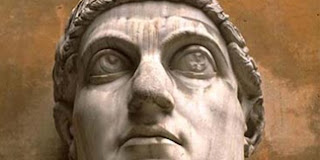Rome is the second episode in Christianity: A History, which focuses on the appropriation of Christianity by the Roman state from the time of Constantine. With masterful choice the producers chose a politician to front the programme, and a lapsed Catholic at that, controversial former British Tory cabinet member Michael Portillo. A more appropriate choice to discuss the conniving Constantine would be hard to imagine.
The film begins in the wilds of Cappadocia, then moves to Ephesus before training its gaze on Rome and Constantinople. I was waiting for the usual lineup of suspects to appear with expert cameo commentary, but in fact the producers scorned the familiar faces and instead delivered various Turkish and English academics and Vatican officials. It made for a refreshing change.
The underlying questions: should the church be in bed with the state? Was Constantine's adoption of the church a good or bad thing? The answers are more muddied in Europe than America or Australasia, but Portillo ultimately gives Constantine - and his legacy - the thumbs down. Who'd have thought a Conservative politician would have been capable of such a thing? Eusebius is described as the emperor's PR agent, and I nearly stood up and cheered when Augustine of Hippo's dubious contributions to church history - the elevation of the papacy and the travesty of "just war" theory - were raised. Striking shots of St John Lateran in Rome, the Hagia Sophia in Istanbul and the bizarre sight of frocked bishops in the British House of Lords, add to the impact of the programme.



I wonder if, after the nationalization of Christianity by Constantine, it slowed down the burning of books (and the intellectuals who wrote them) by the Christian leaders/enforcers?
ReplyDeleteAm I the only one who finds the conclusions this program is coming to, disturbingly familiar?
ReplyDeleteI do agree, quite substantially, with Tom Harpur's Pagan Christ thesis. Unfortunately he is pretty much universally reviled by Anglicans for holding it (and, IIRC, was kicked out by the Anglicans for putting forth E Wallis Budge's old theories with such success).
However, Harpur insists that he is still Christian, and that he still holds fast to the tenets of the pagan church; he just does so with open eyes and honesty. Harpur has rock-solid integrity, in this at least, but it's easy to see why the Anglicans shrieked in horror, and dropped him like a hot potato.
I would be interested to know (shipping costs and finances currently directed towards tuition prevent me from ordering the series myself) if this section takes the "pagan Christ" approach Harpur does, or if it holds to the historicity promulgated in the first part of the series that you've reviewed?
IIRC, xhwa has also debunked the Constantine Con theory on As Bereans Did --- but his perspective may not be entirely free of bias, in my opinion.
Which makes me wonder if it is at all possible, to look back that far in history, and try to decide what Constantine was really up to, without colouring the events of dim and ancient history with our own prejudices? (I include myself in this.)
Given the imminent demise of the Roman Catholic Church (How's your Beast Power looking now, CoG false prophets?!) perhaps arguments for or against Constantinian Christianity will soon (but not nearly soon enough), at long last, be laid to rest with the religion itself.
If only the fundagelicals did not appear so zealously over-eager to rush in and fill the vacuum, it really would be a harbinger of a better world.
I hope this program makes it to the USA!
ReplyDeleteOne thing the Jews learned throughout their history would concern the questionable reliability of kings. Since royal dynasties do not allow for the possibility of the types of screening applied to our police officers and executives of today, there is great potential for bad, especially in the absence of checks and balances.
I'm just finishing out a reading of the complete unabridged works of Josephus. This has provided incredible insights into the period between the testaments, as well as the period between the crucifixion of Jesus Christ and the fall of Jerusalem. In the lead up towards the birth of Christ, Herod the Great, an Idumean, was the total fulfillment and personification of Samuel's prophecy regarding the evils that a king would bring to the Israelites.
Josephus is a lengthy read, but I'd highly recommend his works as being well worth the time.
BB
"I wonder if, after the nationalization of Christianity by Constantine, it slowed down the burning of books (and the intellectuals who wrote them) by the Christian leaders/enforcers?"
ReplyDeleteThe burning of Alexandria suggests otherwise. As Peter Gandy says (of the Constantinian Christians) "They burned down the Ancient World."